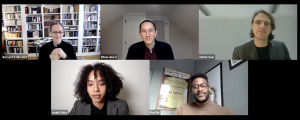A Joint Session with the Institute for Social Research at Goethe-Universität Frankfurt
Professors Martin Saar and Bernard E. Harcourt discuss Pollock, Neumann, and Adorno on State Capitalism
&
A performance by Heartbeat Opera of Breathing Free with presentations by Filmmaker Anaiis Cisco, Director Ethan Heard, and Creative Producer Ras Dia
Featuring the Oakdale Community Choir, KUJI Men’s Chorus, Hope Thru Harmony Women’s Choir, UBUNTU Men’s Chorus, and East Hill Singers
Readings:
“State Capitalism: Its Possibilities and Limitations” by Friedrich Pollock
Behemoth: The Structure and Practice of National Socialism, 1933–1944 by Franz Neumann (excerpts)
“Late Capitalism or Industrial Society?” by Theodor W. Adorno
One Dimensional Man by Herbert Marcuse (excerpts).
Thursday, December 17, 2020
~~~
In this session, our seminar turns to the question of the abolition of capital and capitalism. Our challenge is to reimagine and resituate contemporary social movements for the abolition of capital within the framework of abolition democracy. We will do so through a close reading of the mid-century debate within the Frankfurt School over the history and transformations of Western capitalism. In the process, we will discuss the abolition of feudal property relations and paradigm shifts in political economy. We will also discuss arguments for cooperation as an alternative to capital.
During World War II, several members of the Frankfurt School initiated a conversation over the changing nature of capitalism especially in Germany during Hitler’s Third Reich and the rise of National Socialism. At the time, the new form of state-controlled totalitarian capitalism raised significant challenges to economic theories and histories—whether they were neo-classical liberal theories of a laissez-faire government or Marxist theories of the inevitable crises of accumulation and demise of capitalist modes of production. A well-functioning centralized type of capitalism, involving state planning, defied most prevailing ideas about both capitalism and late capitalism.
The sociologist and economist Friedrich Pollock (who founded with Felix Weil and served as director of the Institute for Social Research at various times), and the political and legal theorist, Franz Leopold Neumann, instigated a debate over competing analyses of National Socialism in Germany. Pollock offered an interpretation of National Socialism as a new form of “state capitalism” and suggested the potential promise of democratically-controlled central planning, in an article titled “State Capitalism: Its Possibilities and Limitations,” published in 1941. By contrast, Neumann developed a theory of National Socialism as an irremediable, irrational, and power-driven form of totalitarian monopoly capitalism on the model of Hobbes’s lawless Behemoth (as opposed to Hobbes’s orderly Leviathan), in his book Behemoth: The Structure and Practice of National Socialism, published in 1942. Theodor Adorno would later weigh in on this debate, developing his own particular conception of “late capitalism,” in an essay titled “Late Capitalism or Industrial Society?” delivered to German sociologists in 1968 and in other writings. Herbert Marcuse as well, in his book One-Dimensional Man published in 1964, offered a related critique of administered living in the welfare state.
By returning to this debate, and to this history, we hope to shed light on today’s many movements for the abolition of capital—ranging from recent writings on the creation of a “common” (including the work of Pierre Dardot and Christian Laval, Common: On Revolution in the 21st Century, and Michael Hardt and Toni Negri, Commonwealth and Assembly), recent work on the idea of communism (including the work of Étienne Balibar and Slavoj Žižek), as well as recent proposals for a new form of coöperationism (including my work-in-progress titled For Coöperation and the Abolition of Capital).
The session begins with a performance of two excerpts from Heartbeat Opera‘s Breathing Free: Anthony and Thulani Davis’s “I would not tell you what I know” from X (The Life and Times of Malcom X) performed by Derron Acon and the Breathing Free Band, and Beethoven’s “O welche Lust” (Prisoners’ Chorus from FIDELIO ) performed by Oakdale Community Choir, KUJI Men’s Chorus, Hope Thru Harmony Women’s Choir, UBUNTU Men’s Chorus, and East Hill Singers. The performance is followed by a conversation with Filmmaker Anaiis Cisco, Director Ethan Heard, and Creative Producer Ras Dia. The libretto and more information on the production can be found in the Breathing Free digital program.
Welcome to Abolition Democracy 6/13!

